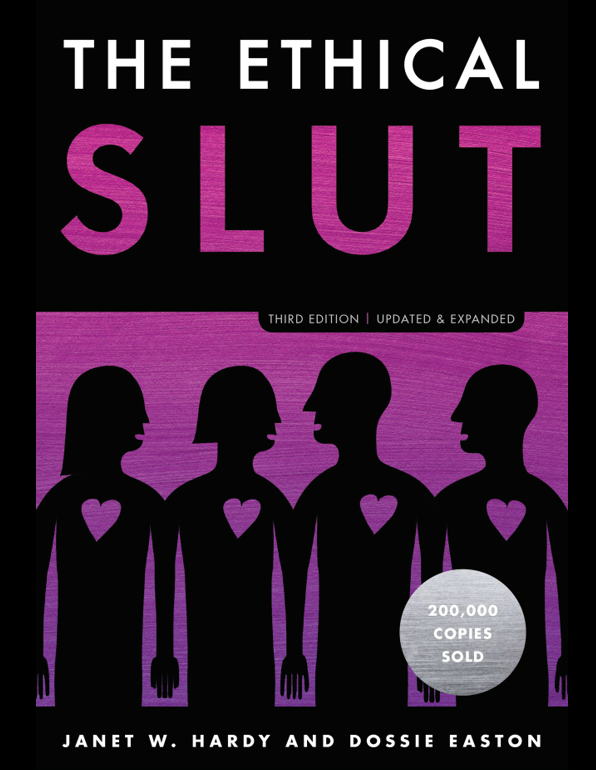The Ethical Slut
By Janet W. Hardy and Dossie Easton
2017 – Ten Speed Press
1. Who is an ethical slut?
We love adventure. The word adventurer is sometimes used pejoratively, suggesting that the adventurous person is immature or inauthentic, not really willing to “grow up” and “settle down” into a presumably monogamous lifestyle. We wonder: What’s wrong with having adventures? Can’t we have adventures and still raise children, buy houses, and do the work that’s important to us? Of course we can; sluts qualify for mortgages just like everybody else. We tend to like our lives complicated, and the challenge of maintaining stable work and home lives while discovering new people and ideas is just what we need to keep us interested and engaged. (4)
Indeed, we hope this book contributes to a world where you won’t settle for anything less than love and freedom in your sex life. (6)
Pansexual means including everyone as a sexual being: straight, bi, lesbian, gay, asexual, nonbinary, trans, queer, old, young, disabled, pervert, male, female, questioning, transitioning. (7) #glossary
2. Myths and Realities
You may find the right way for you and three years from now decide you want to live a different way—and that’s fine. You write the script, you get to make the choices, and you get to change your mind, too. (11)
(Think about the cultural assumptions that underlie one insult thrown at women who like to have a lot of sex: “cheap.” In other words, female sexuality is a commodity and, like all commodities, is made more valuable by its rarity—so a woman who shares sex widely is reducing her own market value.) (14)
A subset of this myth is the belief that if you’re really in love, you will automatically lose all interest in others; thus, if you’re having sexual or romantic feelings toward anyone but your primary partner, you’re not really in love. This belief has cost many people a great deal of happiness through the centuries, yet is untrue to the point of absurdity: a ring around the finger does not cause a nerve block to the genitals.
And, we must ask, if monogamy is the only acceptable option, the only true form of love, than are these agreements genuinely consensual? If you believe that you have no other choice, we believe that you lack the agency that underlies informed consent. We have many friends who have chosen to be monogamous, and we applaud them. But how many people in our society consciously make that choice? (16)
On the contrary, we have found that jealousy is an emotion like any other: it feels bad (sometimes very bad), but it is not intolerable. We have also found that many of the “oughta-be’s” that lead to jealousy can be unlearned, and that unlearning them is often a useful, sometimes even profoundly healing, process. (18)
It is cruel and insensitive to interpret an affair as a symptom of sickness in the relationship, as it leaves “cheated-on” partners—who may already be feeling insecure—wondering what is wrong with them. (19)
Many people have sex outside their primary relationships for reasons that have nothing to do with any inadequacy in their partner or in the relationship. (19)
3. Our Beliefs
15. Roadmaps Through Jealousy
Let us point out that monogamy is not a cure for jealousy. (135)
When we choose to confront the feeling of jealousy rather than run away from it, we can see more clearly what jealousy truly is for each of us. Jealousy is not a single emotion. It can show up as grief or rage, hatred or self-loathing—jealousy is an umbrella word that covers the wide range of emotions we might feel when our partners make sexual connection with somebody else.
Jealousy may be an expression of insecurity, fear of rejection, fear of abandonment, or feeling left out, not good enough, inadequate, or awful. Your jealousy may be based in territoriality or in competitiveness or in some other emotion that’s clamoring to be heard under the jealous racket in your brain. Sometimes it may show up as blind screaming rage—and being blind makes it very difficult to see.(138) #glossary
Sometimes jealousy is rooted in feelings of grief and loss, which can be harder to interpret. We have been taught by our culture that when our partner has sex with another, we have lost something. (140) **Really dislike their take on this which comes immediately after–The authors say this version of jealousy confuses them. It’s like–if you can’t wrap your head around this very prevalent form of jealousy, maybe find someone to write this chapter who can?

